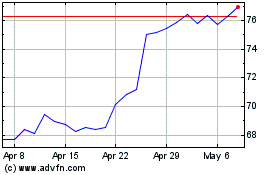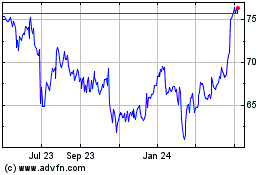By Kim Mackrael
Several countries have shifted their guidance in recent days on
who should receive the AstraZeneca PLC vaccine, as public-health
officials continue to weigh the risk of the vaccine against the
prevalence of Covid-19 cases.
The AstraZeneca shot hasn't been cleared for use in the U.S.,
unlike Covid-19 vaccines from Pfizer Inc., Moderna Inc. and Johnson
& Johnson. But in some wealthy countries where the supply of
those vaccines has been more constrained, AstraZeneca doses have
been offered to people as young as 30, showing the wide variation
even among wealthy countries in vaccination campaigns.
On Friday, the U.K.'s vaccines advisory body said the vaccine
produced by AstraZeneca, which has raised concerns among health
experts due its possible link to rare blood clots, should
preferably not be given to people under 40. Previous guidance
suggested the vaccine should preferably not be given to people
under 30.
In Canada last week, members of a national expert panel referred
to the vaccines made by Pfizer-BioNTech and Moderna as the
preferred option after elected officials had earlier encouraged
citizens to get the first vaccine available, which for some age
groups was AstraZeneca's shot.
Meanwhile, German officials on Thursday took the opposite tack,
saying they would make the vaccine available to all adults after
earlier limiting it to those 60 years and older, as it sought to
speed up a vaccination campaign that had gotten off to a slow
start.
AstraZeneca has struggled to pull together the data required for
an emergency-use authorization for its Covid-19 vaccine in the
U.S., and on Friday people familiar with the matter said it could
skip that step in favor of pursuing a more time-intensive
application for a full-fledged license to sell the shot. U.S.
government and public-health officials have said they have ample
supplies of other vaccines that are already authorized for use.
Health officials point out that with the pandemic abating in
certain countries, the calculations around the benefits of
receiving a vaccine change.
British officials said Friday that while the risks of suffering
the rare blood clots from the AstraZeneca vaccine are minuscule,
they now outweigh the risks of someone under 40 suffering a fatal
Covid-19 case. The calculation of the overall safety of the vaccine
itself hasn't altered, the U.K. medicines regulator said.
They said unvaccinated individuals under 40 should receive
alternative vaccines, "where available and only if this does not
cause substantial delays in being vaccinated."
Raywat Deonandan, an epidemiologist at the University of Ottawa,
said it is reasonable for experts' advice to change as new evidence
emerges, and officials should be open with the public about what
they know and recommend.
But he said officials can struggle to communicate both the risks
and benefits of the AstraZeneca vaccine, adding to confusion and
potentially chipping away at public trust.
He said confusing messaging has been displayed in Canada: Last
month authorities in many parts of the country began allowing
people in their 40s and early 50s to book appointments for
AstraZeneca's vaccine. Prime Minister Justin Trudeau, who has
repeatedly said the best vaccine is the first one that is
available, was among those who signed up.
Yet on the day Mr. Trudeau received his shot, the expert panel,
called the National Advisory Committee on Immunization, said it
preferentially recommended the messenger RNA vaccines produced by
Pfizer-BioNTech and Moderna. It said AstraZeneca's vaccine should
be offered to those 30 years and older who don't want to wait, and
for whom the benefits outweigh the risks.
The panel last week said individuals needed to be aware of their
options so they could make an informed choice about whether to be
vaccinated with the first available vaccine, or to wait for a
messenger RNA option.
"The only message that really got through [in past weeks] was,
'accept the first vaccine that's offered to you,' " said Prof.
Deonandan. "Now you hear it's OK to wait for the better dose?
That's a slap in the face."
Canada's chief public health officer, Theresa Tam, said she
didn't see the advice from the government and the panel as
different.
"Everyone is trying to provide the best information in order for
everyone to make a decision," Dr. Tam said.
Michelle Baysan, who tweeted about getting her vaccine last
month, said she was bothered by the change in tone.
"Now I have anxiety that I've injected something into myself
that 'isn't the best option,' " said the 43-year-old from Richmond,
British Columbia. Still, she added that she was glad to have
received a vaccine dose.
The Canadian advisory panel has said the risk of vaccine-induced
immune thrombotic thrombocytopenia, or blood clotting, was about
one in 100,000. As of May 6, Canada had reported 11 cases of blood
clots and three blood clot-related deaths. It had administered more
than 2 million AstraZeneca shots as of May 1.
In the U.K. as of April 28, there were 242 reported cases of
blood clots in people receiving the AstraZeneca vaccine. They
resulted in 49 deaths. So far 22.6 million first doses of the
AstraZeneca vaccine have been administered in Britain.
Britons aren't usually given a choice of which vaccine they
receive, unless they are in a younger age group, with doses
allocated on the basis of what is available and can be easily
stored and administered. Opinion polling and data on take-up of
vaccines suggest concerns around blood clots haven't significantly
dented Britons' willingness to get vaccinated.
Other countries have seen more hesitancy. In Australia, where
the AstraZeneca vaccine is recommended for those 50 years and
older, a poll by Essential Research found 37% of all adults said
they would be willing to get either the AstraZeneca or Pfizer
vaccine, while 27% said they would only be willing to have the
Pfizer shot. Just 3% of those surveyed said they would take
AstraZeneca's vaccine but not Pfizer's, and 14% said they wouldn't
want to take either vaccine.
In Europe, just over a third of Germans and 23% of French people
said they considered the AstraZeneca vaccine to be safe, according
to a recent survey from YouGov.
Meanwhile, health officials in the U.S. have said a 10-day halt
in administering Johnson & Johnson's Covid-19 vaccine, which
has also been associated with rare blood clots, have made some
Americans more hesitant to get vaccinated.
Canadians' confidence in the AstraZeneca vaccine rose sharply
during the second half of April, a poll from the Angus Reid
Institute suggested, corresponding with the period when many
members of Canada's Generation X, or those born between 1965 and
1980, signed up for appointments. Doses of that vaccine were
previously set aside for people over 55 in most provinces, but
uptake had slowed, experts said, prompting a gradual expansion to
younger age groups.
Gen Xers were posting selfies of their inoculations and
encouraging others to get the shots. A survey conducted between
April 20 to 22 found that 52% of Canadians who were willing to be
vaccinated were comfortable getting AstraZeneca's vaccine, up from
41% earlier in the month.
Heather Badenoch, a 45-year-old Ottawa resident who spent three
days trying to snag an AstraZeneca appointment at overbooked
pharmacies, said she was glad to have some protection, especially
because her husband and mother-in-law would both be considered high
risk if they contracted Covid-19.
"Zero regrets and pleased to have the antibodies," Ms. Badenoch
said last week.
Jason Douglas and Max Colchester contributed to this
article.
Write to Kim Mackrael at kim.mackrael@wsj.com
(END) Dow Jones Newswires
May 09, 2021 14:11 ET (18:11 GMT)
Copyright (c) 2021 Dow Jones & Company, Inc.
AstraZeneca (NASDAQ:AZN)
Historical Stock Chart
From Mar 2024 to Apr 2024

AstraZeneca (NASDAQ:AZN)
Historical Stock Chart
From Apr 2023 to Apr 2024
